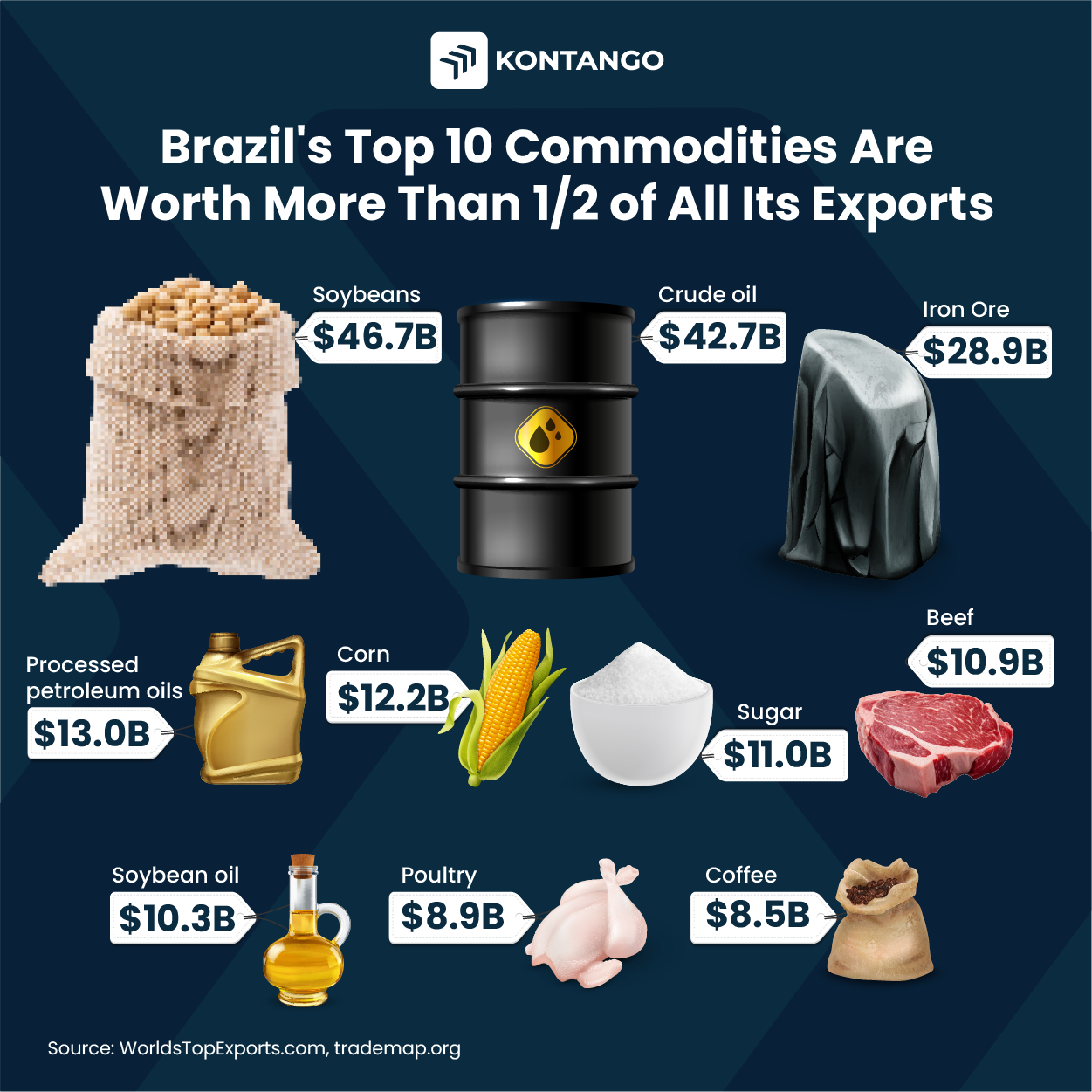Brazil’s Top 10 Commodities Are Worth More Than Half of All Its Exports
Centuries of agricultural development have transformed Brazil into a global powerhouse. Indigenous communities had cultivated essential crops like cassava, maize, and beans for millennia, establishing a foundation for future agricultural development. In the 16th century, European colonization introduced sugarcane, transforming the landscape and economy. Sugarcane plantations dominated Brazil's exports for centuries, shaping its colonial era.
During the 17th and 18th centuries, tobacco emerged as a major export crop for Brazil, particularly in the South and Southeast regions. Its popularity and export value made it a significant source of income and fueled economic growth. Cotton cultivation also gained traction during this period, especially in the North and Northeast. This export crop offered high potential due to growing demand, contributing to Brazil's economic diversification.
Coffee plantations flourished in the 19th century, making Brazil the world's leading producer and fueling economic growth. The 20th century brought further diversification, with soybeans, oranges, and beef joining the export roster. Technological advancements and land expansion propelled Brazil's agricultural output, solidifying its position as a global powerhouse.
Between 2000-2012, Brazil was one of the fastest-growing major economies in the world, with an average annual GDP growth rate of over 5%. According to the International Monetary Fund (IMF) data for 2023, Brazil has the 9th largest nominal GDP in the world, at $2.126 trillion, and the 8th largest purchasing power parity globally, with a value of $4.101 trillion.
Rich in natural resources, Brazil is a major exporter of over 200 agricultural products. Its ten most valuable commodities alone make up 57% - or $193B - of its total export value, which reached $334B in 2022:
1. Soybeans • $47B: Vast, fertile plains in central Brazil, dubbed the "Matopiba region," form the heart of this booming agribusiness. Mechanized farms efficiently cultivate these protein-rich legumes, feeding a growing global demand.
2. Crude Oil • $43B: Deep below the ocean surface off Brazil's southeastern coast lies the Presalt Basin, a treasure trove of crude oil. Advanced technology allows extraction even from these challenging depths, contributing significantly to the national economy. international markets.
3. Iron Ore • $29B: The mineral-rich hills of Minas Gerais state hold the key to this resource. Large-scale mines extract the iron ore, fueling the global steel industry with this vital raw material.
4. Processed Petroleum Oils • $13B: Taking crude oil a step further, Brazil boasts sophisticated refineries that transform it into gasoline, diesel, and other fuel products, meeting domestic needs and contributing to exports.
5. Corn • $12B: Similar to soybeans, corn finds its home in the expansive central plains. Often grown in rotation with soybeans, this versatile grain serves as animal feed and a key ingredient in various food products.
6. Sugar • $11B: The lush sugarcane fields of São Paulo state tell a story of centuries-old tradition. Modern farming techniques combined with efficient processing plants keep Brazil at the forefront of global sugar production.
7. Beef • $11B: From sprawling cattle ranches in the Cerrado savanna to feedlots in southern states, Brazil is a major beef producer. Bovine meat exports find their way to international markets, satisfying appetites worldwide.
8. Soybean Oil • $10B: A byproduct of processing soybeans, this versatile oil finds uses in cooking, food manufacturing, and even biofuels. Its production further elevates the economic value of Brazil's massive soybean harvest.
9. Poultry • $9B: Modern poultry farms across the country, particularly in southern states, contribute to this rapidly growing export sector. Chicken meat production meets both domestic and international demand, showcasing Brazil's agricultural diversification.
10. Coffee • $8.5B: The rolling hills of southern Minas Gerais, birthplace of iconic brands like Arabica and Robusta, continue to produce some of the world's most beloved coffee beans. Traditional farming methods and modern processing techniques ensure premium quality exports.
In conclusion, Brazil's centuries-long evolution as an agricultural and resource powerhouse has secured its position as a dominant force in the global market. Its remarkable rise is further highlighted by its impressive global rankings: the ninth-largest nominal GDP and the eighth-largest purchasing power parity worldwide according to IMF data for 2023. Furthermore, the dominance of Brazil's top 10 commodities, contributing over half of its exports, stands as a testament to the nation's commodity export prowess. From soybeans and crude oil to processed petroleum oils and coffee, Brazil's broad portfolio of exports reflects its rich natural resources and innovative agricultural practices. Looking ahead, Brazil's economic strength and resource wealth offer a promising trajectory for continued global influence and prosperity.

